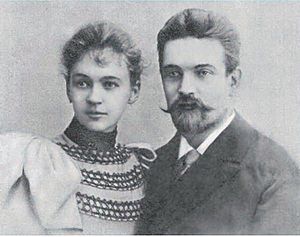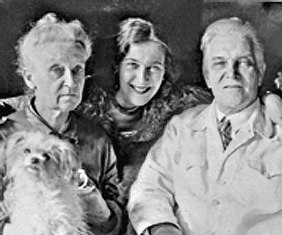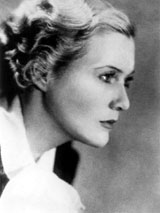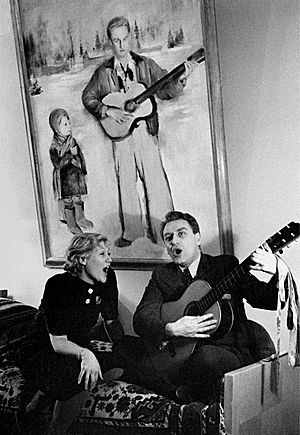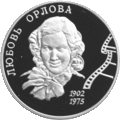Lyubov Orlova facts for kids
Quick facts for kids
Lyubov Orlova
|
|
|---|---|
| Любовь Орлова | |
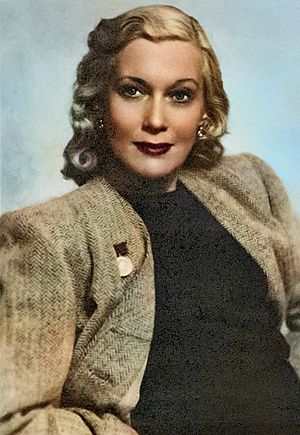
Lyubov Orlova playing a famous female scientist in Springtime, 1947
|
|
| Born |
Lyubov Petrovna Orlova
11 February 1902 Zvenigorod, Moscow Governorate, Russian Empire
|
| Died | 26 January 1975 (aged 74) Moscow, Russian SFSR, USSR
|
| Resting place | Novodevichy Cemetery, Moscow |
| Alma mater | Moscow Conservatory |
| Occupation | Actress, pianist, singer, dancer |
| Years active | 1926–1974 |
| Spouse(s) |
|
| Awards |
|
Lyubov Petrovna Orlova (Russian: Любовь Петровна Орлова [lʲʊˈbofʲ pʲɪˈtrovnə ɐrˈɫovə]; February 11, 1902 – January 26, 1975) was a famous Soviet and Russian actress, singer, and dancer. She was even named a People's Artist of the USSR in 1950, which is a very high honor. Her first name, Lyubov, means "love" in Russian, and her last name, Orlova, comes from the word for "eagle."
Contents
Early Life and Talent
Lyubov Orlova was born into a noble family in Zvenigorod, a town not far from Moscow. Her family later moved to Yaroslavl. From a young age, it was clear she had a special talent for acting and singing. However, her parents wanted her to focus on classical music.
In 1914, Lyubov and her older sister moved to Moscow with their mother. During the difficult years of the Russian Civil War, her family lived in Voskresensk. They made money by selling milk from their aunt's cow. Lyubov and her sister would travel long distances to Moscow and back, carrying heavy cans of milk. This hard work made her hands rough, which she was always a bit shy about.
When she was only seven years old, the famous singer Fyodor Shalyapin saw her talent and predicted she would become a well-known actress.
Education and Early Career
From 1919 to 1922, Lyubov studied piano at the Moscow Conservatory. She couldn't finish her studies because she needed to work to help her family. She became a music teacher and played piano for silent films in movie theaters. In 1925, she graduated from the choreography (dance) department of the Moscow Theatre College.
In 1926, Lyubov decided to become an actress and joined the Nemirovich-Danchenko Theatre Music Studio as a choir singer. She quickly got her first solo role that same year. By 1932, she was playing leading roles in popular shows like La Périchole and Les cloches de Corneville. She even performed a special dance move on her tiptoes (en pointe) during a singing part, which amazed the audience and became a legendary moment.
Becoming a Film Star
In 1933, Lyubov met Grigory Alexandrov, a new film director. They soon married. She starred in his movie Jolly Fellows (1934), which became very popular in the Soviet Union. This film helped her become a big star and earned her the title "Honorable actor of the RSFSR". Many women in the Soviet Union admired her and even tried to look like her by lightening their hair.
Over the next few years, she starred in several more hit movies that are still considered classics today:
- Circus (1936)
- Volga-Volga (1938)
- Tanya (1940)
- Springtime (1947)
She received the Stalin Prize in 1941 for her roles. In 1950, she made history by becoming the first woman to be named a People's Artist of the USSR just for her work in films. After this, she focused more on theater plays.
Lyubov also toured constantly as a singer with her pianist, Leo Mironov. During World War II, she traveled over 50,000 kilometers along the front lines to perform for soldiers. She sang many songs from her movies, especially those by Isaak Dunayevsky.
Personal Life
Lyubov Orlova was married twice. Her first husband was a Soviet economist named Andrei Berzin. They married in 1926 and divorced by 1931.
In January 1934, she married the famous film director Grigori Aleksandrov. In 1941, Lyubov adopted Grigori's son, Douglas (who was renamed Vasili), from his previous marriage. Lyubov never had her own children.
Later Years and Legacy
Lyubov Orlova passed away on January 26, 1975, in Moscow, Russia, from pancreatic cancer. She was buried in the Novodevichy Cemetery in Moscow.
Lyubov Orlova is remembered as one of the most important actresses of the Soviet era. She was a true icon.
- A small planet, 3108 Lyubov, discovered in 1972, was named after her.
- A cruise ship, the MV Lyubov Orlova, was also named in her honor.
In polls conducted in 1999 and 2010, Lyubov Orlova was voted as one of the greatest "Russian Idols of the 20th Century." She was the highest-rated woman in the 1999 poll. In 2016, a monument of her was placed in her hometown of Zvenigorod. In 2019, she was featured as a Google Doodle to celebrate what would have been her 117th birthday.
Awards and Honours
 Honored Artist of the RSFSR (1935)
Honored Artist of the RSFSR (1935) People's Artist of the RSFSR (1947)
People's Artist of the RSFSR (1947) People's Artist of the USSR (1950)
People's Artist of the USSR (1950) USSR State Prize, first class
USSR State Prize, first class
- 1941 — for her roles in Circus and Volga-Volga
- 1950 — for her role in Encounter at the Elbe
 Order of Lenin (1939)
Order of Lenin (1939) Orders of the Red Banner of Labour (1938, 1967)
Orders of the Red Banner of Labour (1938, 1967) Medal "For the Defence of the Caucasus" (1944)
Medal "For the Defence of the Caucasus" (1944) Medal "For Valiant Labour in the Great Patriotic War 1941–1945" (1945)
Medal "For Valiant Labour in the Great Patriotic War 1941–1945" (1945) Medal "In Commemoration of the 800th Anniversary of Moscow" (1947)
Medal "In Commemoration of the 800th Anniversary of Moscow" (1947) Medal "For the Development of Virgin Lands"
Medal "For the Development of Virgin Lands" Jubilee Medal "In Commemoration of the 100th Anniversary of the Birth of Vladimir Ilyich Lenin" (1970)
Jubilee Medal "In Commemoration of the 100th Anniversary of the Birth of Vladimir Ilyich Lenin" (1970)- VIII Venice Film Festival (1947, Special Prize for best female role in Springtime)
- IV International Film Festival in Mariánské Lázně (1949, Peace Prize for Encounter at the Elbe)
Filmography
| Year | Title | Original Title | Role | |
|---|---|---|---|---|
| 1933 | Alëna's Love | Любовь Алёны | Mrs Ellen Getwood | |
| 1934 | A Petersburg Night | Петербургская ночь | Grushen’ka | |
| 1934 | Jolly Fellows | Весёлые ребята | Anyuta | |
| 1936 | Circus | Цирк | Marion Dixon | |
| 1938 | Volga-Volga | Волга-Волга | letter carrier Dunya Petrova ("Strelka") | |
| 1939 | Engineer Kochin's Error | Ошибка инженера Кочина | Ksenia Lebedeva | |
| 1940 | Tanya | Светлый путь | Tanya Morozova "Cinderella" | |
| 1941 | Fighting Film Collection #4 | Боевой киносборник № 4 | letter carrier Dunya Petrova ("Strelka") | |
| 1941 | The Artamonov Business | Дело Артамоновых | dancer Paula Menotti | |
| 1943 | A Family | Одна семья | Katya | |
| 1943 | People of the Caspian | Каспийцы | documentary | |
| 1947 | Springtime | Весна | actress Vera Shatrova / scientist Irina Nikitina | |
| 1949 | Encounter at the Elbe | Встреча на Эльбе | Jeannette Sherwood, journalist | |
| 1950 | Mussorgsky | Мусоргский | Yuliya Platonova | |
| 1952 | Man of Music | Композитор Глинка | Lyudmila Ivanovna | |
| 1960 | Russian Souvenir | Русский сувенир | Varvara Komarova (Miss Barbara) | |
| 1974 | Starling and Lyre | Скворец и Лира | Lyudmila Grekova ("Lyre") |
Theatre Roles
Stanislavski and Nemirovich-Danchenko Theatre
- 1926 — Hersillie, Babet (La fille de Madame Angot)
- 1927 — Georgette (The Italian Straw Hat)
- 1932 — Serpolette (Les cloches de Corneville)
- 1932 — La Périchole (La Périchole)
Mossovet Theatre
- 1947 — Jessie (The Russian Question by Konstantin Simonov)
- 1953 — Lydia (Somov and Others by Maxim Gorky)
- 1955 — Lizzie (Lizzie McKay)
- 1958 — Nora (Nora / A Doll's House by Henrik Ibsen)
- 1963 — Patrick Campbell (Dear Liar by Jerome Kilty)
- 1972 — Ethel Savage (Strange Mrs Savage / The Curious Savage by John Patrick)
Popular Songs
- From Jolly Fellows (1934)
- "Anyuta's song"
- "Such a lot of nice girls"
- "Tyuh-tyuh" ("Our iron is on fire...")
- From Circus (1936):
- "Song on a Cannon"
- "Moonlight Waltz"
- "Lullaby"
- "Song of the Motherland"
- From Volga-Volga (1938):
- "Song about the Volga"
- "Youth"
- From Tanya (1940)
- "Song-Bird"
- "Chastushkas"
- "Enthusiasts' March"
- From Fighting Film Collection No.4 (1941)
- "March of the Jolly Fellows (Military)"
- From Springtime (1947)
- "Spring is coming"
Most of the music for her films was by Isaak Dunayevsky. Lyubov Orlova was also a trained pianist and worked as a musician before becoming an actress.
Images for kids
-
2002, Bank of Russia coin celebrating her 100th Anniversary
See also
 In Spanish: Liubov Orlova para niños
In Spanish: Liubov Orlova para niños
 | Aaron Henry |
 | T. R. M. Howard |
 | Jesse Jackson |


